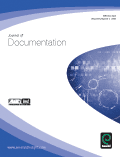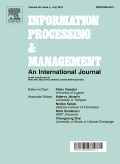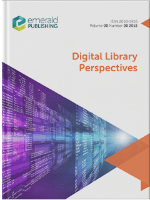
Information Technology & People
Scope & Guideline
Pioneering studies that shape the future of IT and human behavior.
Introduction
Aims and Scopes
- Human-Technology Interaction:
Research exploring how individuals interact with technology, including user experience, design considerations, and the psychological impacts of technology use. - Digital Transformation and Organizational Change:
Studies examining how organizations adapt to digital technologies and the implications for business processes, culture, and employee engagement. - Social Media and Community Dynamics:
Investigations into the role of social media in shaping community interactions, social behaviors, and the effects of digital connectivity on social capital. - Ethics and Privacy in Technology:
Research addressing ethical considerations, privacy concerns, and the societal implications of technology, particularly in light of regulations like GDPR. - Health and Well-being in Digital Contexts:
Exploration of how technology impacts health outcomes, well-being, and the adoption of digital health solutions. - Emerging Technologies and Innovation:
Studies on the adoption and impact of emerging technologies such as AI, blockchain, and big data analytics, focusing on their transformative potential in various sectors.
Trending and Emerging
- AI and Machine Learning Applications:
There is a growing body of research on the applications of AI and machine learning across various sectors, particularly in enhancing user experience and organizational efficiency. - Impact of Remote Work and Digital Collaboration:
Research on the effects of remote work, especially post-COVID-19, and the dynamics of digital collaboration tools has surged, highlighting changes in workplace interactions. - Social Media Influencer Dynamics:
An increasing focus on the role of social media influencers in marketing, community engagement, and consumer behavior reflects the evolving landscape of digital marketing. - Mental Health and Technology Use:
Emerging research examines the intersection of mental health and technology use, particularly concerning technostress and the psychological impacts of constant connectivity. - Sustainable Technology Practices:
There is a rising interest in studies that explore the role of technology in promoting sustainability and ethical consumption, addressing the growing concerns over environmental impact.
Declining or Waning
- Traditional E-commerce Models:
There has been a noticeable decrease in studies focusing solely on traditional e-commerce models as newer, more innovative approaches, such as social commerce and gamification, gain traction. - Digital Divide Discussions:
While initially a significant focus, discussions around the digital divide have become less prominent as the narrative shifts towards digital inclusion and the impacts of digital literacy. - Static User Behavior Analysis:
Research centered on static analyses of user behaviors without considering dynamic contexts or interactions has diminished, giving way to more context-aware studies. - Legacy Technology Systems:
The exploration of legacy technology systems and their challenges has waned as organizations increasingly adopt cloud services and agile methodologies.
Similar Journals

DESIDOC Journal of Library & Information Technology
Fostering Excellence in Library and Information TechnologyDESIDOC Journal of Library & Information Technology, published by the Defence Scientific Information Documentation Centre, is a pivotal scholarly platform in the realm of Library and Information Sciences. The journal, indexed with ISSN 0974-0643 and E-ISSN 0976-4658, has established its reputation with a commendable Q3 category ranking in the latest Scopus quartiles and a notable rank of 113 out of 280 in its field, placing it in the 59th percentile. Engaging a global audience, it disseminates high-quality research insights aimed at advancing the practices and technologies within library and information management. Operating within a converged timeframe from 2012 to 2024, the journal is committed to fostering robust discussions surrounding contemporary issues in the field, making it an invaluable resource for researchers, professionals, and students alike. While currently not offering open access, its content is accessible through institutional subscriptions, reinforcing its significance in the academic community of India and beyond.

Information Resources Management Journal
Illuminating Pathways in Information Resource Management.Information Resources Management Journal, published by IGI Global, is a pivotal academic resource dedicated to the exploration of innovations and best practices in the realms of information management, library sciences, and strategic management. First established in 1988, this journal has continually evolved, providing researchers and practitioners with essential insights that shape the industry. With an impressive Scopus ranking positioning it within the 75th percentile in Library and Information Sciences, and its notable presence in Business and International Management, it garners attention from a diverse audience keen on navigating the complexities of managing information resources effectively. Although it currently does not offer open access options, the journal remains committed to disseminating impactful research that resonates with scholars and industry professionals alike. As it approaches its convergence year of 2024, Information Resources Management Journal stands as a cornerstone for those aspiring to contribute meaningfully to the ever-evolving landscape of information management.

INFORMATION & MANAGEMENT
Exploring the Frontiers of Information Systems and ManagementINFORMATION & MANAGEMENT, published by Elsevier, stands as a premier journal in the realm of Information Systems and Management Information Systems. With an impressive focus on advancing the understanding and application of information technology to enhance organizational effectiveness, this journal has garnered a distinguished Q1 ranking across various categories in 2023, including Information Systems and Management. The journal's rigorous peer-reviewed platform ensures that cutting-edge research influences practitioners and academics alike. As a testament to its relevance, INFORMATION & MANAGEMENT holds a notable position in Scopus rankings, sitting in the top 5% of journals within its field. Covering a wide scope from foundational theories to innovative applications, it invites contributions that explore the practical implications of information and management technologies, thus making it an essential resource for researchers, professionals, and students dedicated to the evolving landscape of information management.

LIBRARY & INFORMATION SCIENCE RESEARCH
Connecting scholars to emerging trends in information science.LIBRARY & INFORMATION SCIENCE RESEARCH is a premier academic journal dedicated to advancing the field of library and information sciences. Published by Elsevier Science Inc, this journal has established its reputation for rigorous research and impactful scholarship since its inception in 1987. With an impressive Q1 ranking in Library and Information Sciences and a Q2 ranking in Information Systems for 2023, it reflects the growing importance of library sciences in an increasingly digital world. The journal serves as an essential platform for researchers, professionals, and students, offering insightful articles that address emerging trends and challenges in the realm of information dissemination and management. Although not an open-access journal, its contributions are widely recognized, as evidenced by its strong Scopus rankings, with a position of #53 out of 280 in Library and Information Sciences. If you are looking to deepen your understanding of the dynamic interplay between libraries, technology, and information systems, LIBRARY & INFORMATION SCIENCE RESEARCH is an indispensable resource in your academic journey.

JOURNAL OF DOCUMENTATION
Elevating Academic Discourse in Information and Documentation.JOURNAL OF DOCUMENTATION is a premier academic journal published by Emerald Group Publishing Ltd, dedicated to advancing knowledge in the fields of Information Systems and Library and Information Sciences. With an enduring legacy since its inception in 1945, this journal has established itself as a pivotal resource for researchers, professionals, and students alike, providing cutting-edge insights and comprehensive research findings relevant to the ever-evolving landscape of information management. The journal boasts a commendable impact factor and has been ranked in the Q2 category for Information Systems and Q1 for Library and Information Sciences as of 2023, reflecting its significant contribution to these fields. It is indexed in Scopus, with notable rankings in the Social Sciences and Computer Science categories, ensuring visibility and accessibility for the academic community. While the journal currently does not offer open access, it remains committed to disseminating high-quality research that informs practice and stimulates scholarly discussion locally and globally, making it a valuable asset for anyone invested in the study of documentation and information processes.

BEHAVIOUR & INFORMATION TECHNOLOGY
Connecting Behavioral Science with Information Technology.BEHAVIOUR & INFORMATION TECHNOLOGY, published by Taylor & Francis Ltd, is a leading journal in the interdisciplinary field that bridges the gap between technology and human behavior. Established in 1982 and continuing through 2024, this journal has garnered a high reputation with impressive rankings in 2023 across various categories: Q1 in Arts and Humanities (miscellaneous), Q2 in Developmental and Educational Psychology, Q2 in Human-Computer Interaction, and Q1 in Social Sciences (miscellaneous). The journal's robust Scopus rankings point to its influence among peers, being placed in the top percentiles across multiple relevant disciplines. Although it does not offer open access, it remains a pivotal resource for researchers and practitioners interested in the dynamics of technology's impact on behavior. By publishing rigorously peer-reviewed research, BEHAVIOUR & INFORMATION TECHNOLOGY aims to foster insights that enhance our understanding of how information technology shapes human interactions and societal outcomes, making it a crucial publication for anyone engaged in this rapidly evolving field.

INFORMATION PROCESSING & MANAGEMENT
Driving Progress in Library and Information SciencesINFORMATION PROCESSING & MANAGEMENT, published by ELSEVIER SCI LTD, is a distinguished journal at the forefront of research in the fields of Computer Science, Information Systems, Library and Information Sciences, and Management Science and Operations Research. Since its inception in 1975, this journal has continually evolved to provide a scholarly platform for the dissemination of innovative methodologies and frameworks in information processing. With a remarkable Q1 ranking across multiple disciplines and esteemed Scopus rankings—notably, 1st in Media Technology and 4th in Library and Information Sciences—it stands as a pivotal resource for researchers, professionals, and students alike, seeking to advance their understanding and application of information management principles. Although not an Open Access journal, it remains widely accessed and respected, marking its influence in shaping the future of effective information management practices. The journal is committed to providing a rigorous peer-review process, ensuring the publication of high-quality research that addresses current challenges and trends in information technology and its application in various sectors.

International Journal of Enterprise Information Systems
Pioneering Insights in Information Systems ManagementThe International Journal of Enterprise Information Systems, published by IGI Global, stands as a pivotal resource for professionals, researchers, and students engaged with the evolving landscape of information systems and management. With an ISSN of 1548-1115 and E-ISSN 1548-1123, this peer-reviewed journal has been at the forefront of enterprise information research since its inception in 2005, recently achieving a commendable Q2 ranking in both Information Systems and Management and Management Information Systems categories in 2023. It also maintains a solid position in Computer Science Applications with a Q3 categorization. The journal thrives on its diverse scope, focusing on innovative applications and methodologies within information systems, making it crucial for advancing scholarly discourse. Although it does not offer an open-access model, its impactful research contributions, evidenced by a robust Scopus ranking—holding the 48th position in Decision Sciences and 43rd in Business Management—underscore its relevance and high-quality standards in the field. Published in the United States at IGI Global's Hershey headquarters, the journal aims to bridge theory and practice, fostering a vibrant research community dedicated to solving complex enterprise challenges.

Digital Library Perspectives
Shaping Tomorrow's Information Systems TodayDigital Library Perspectives, published by Emerald Group Publishing Ltd, is a pivotal journal in the dynamic fields of Education, Information Systems, and Library and Information Sciences. With an impressive Scopus ranking that places it in the Q1 category for Library and Information Sciences and Q2 for both Education and Information Systems, this journal has established itself as a significant resource for scholars and practitioners alike. The journal's ISSN is 2059-5816 and its E-ISSN is 2054-1694, facilitating broad accessibility to cutting-edge research and innovative practices within digital library environments. Published since 2016, it continues to offer a platform for the exploration of emerging trends, challenges, and technologies affecting digital libraries and information services. Researchers, professionals, and students will find that the journal not only highlights critical advancements but also fosters discussions around best practices and future directions in the industry. While it operates under a subscription model, it remains a crucial contributor to the scholarly dialogue in this essential sector.

Aslib Journal of Information Management
Empowering Research, Shaping the Future of Information SciencesThe Aslib Journal of Information Management, published by Emerald Group Publishing Ltd, stands as a vital resource within the field of library and information sciences, enjoying a prominent position in the academic landscape with an impressive 2023 impact factor. This journal embraces a wide-ranging scope that encompasses innovative research, practical applications, and theoretical advancements in information management. Reflecting its exceptional quality, it has achieved a Q2 ranking in Information Systems and a distinguished Q1 ranking in Library and Information Sciences as of 2023. With its Scopus rankings placing it in the 83rd percentile for Library and Information Sciences, the journal is a leading platform for both scholars and practitioners seeking to advance knowledge in the discipline. The journal is committed to open access, fostering greater visibility and accessibility of research outputs. As it converges on its tenth anniversary (2014-2024), the Aslib Journal of Information Management continues to be an essential tool for researchers, professionals, and students eager to navigate the rapidly evolving landscape of information management.